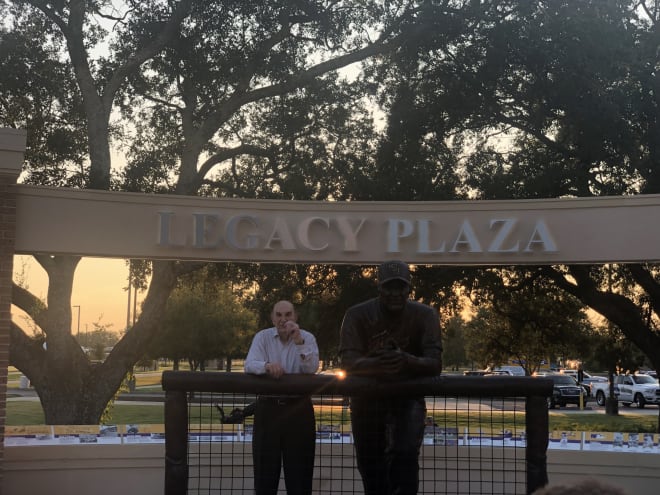Congrats Slip Bertram!

They came from South Florida, from Oxford, Mississippi and from all points in between.
It didn’t matter that the early Friday evening Louisiana sun beaming down on the Alex Box Stadium Legacy plaza roasted bald or graying heads of aging men who traveled miles to see their coach, whether he guided them at Miami Beach High or at the University of Miami or as LSU’s head coach.
On this occasion before an invitation-only gathering, the honoree meant something in so many ways to everyone in attendance.
Yes, Alex Box Stadium/Skip Bertman Field finally got its doorman when Bertman’s statue which was unveiled by his wife Sandy and three daughters Jan, Jodi and Lori.
The man who led LSU to five NCAA national championships in 11 College World Series appearances from 1984 to 2001 before taking over as the Tigers’ athletic director for eight years was almost at loss for words.
“I am truly humbled by this honor,” said the 81-year-old Bertman, who had a record of 870-303-2. “This statue represents a lot of people. I may have been a trailblazer and that was accurate, and I may have touched some lives."
Bertman became the fourth LSU athletic figure and the first Tigers’ coach to be honored with a statue. He joins former Tigers’ basketball stars Bob Pettit and Shaquille O’Neal and 1959 Heisman Trophy winner Dr. Billy Cannon.
LSU president King Alexander said the statue was just a small token of what Bertman gave the university and the baseball program.
“If you really want to see a monument to a coach, to somebody who has built a program, just look behind you,” Alexander said. “The best college baseball facility in the United States and the fans 13,000 a game. Coach, that is all you. That is what you created at this university. That is a tribute few will ever have.”
LSU athletic director Scott Woodward called the statue “not only a monument to Skip, but to the incredible unwavering support of the best fans in America.”
“I want to emphasis not the championships, but Skip’s impact on people,” said Woodward, who referred to Bertman as one of his mentors. “Ask yourself how many young people Skip has mentored over his career, how many administrators, young coaches, assistants, fans, friends, people around the community that have been impacted by this great man.
“We can and should learn from Skip Bertman as a man and a professional his humanity, his decency, his generosity. He put people first every day of his life.”
Like current LSU coach Paul Mainieri, hired 13 seasons ago by Bertman with only one goal in mind.
“I told Skip I didn’t have the goal to become the greatest coach in LSU baseball history,” said Mainieri, who was instrumental in pushing the Bertman statue project. “That will never happen. I just wanted to be the second best.
“I told Skip all I want to do is make you proud.”
That has also been the goal of his former players, such as current Ole Miss baseball coach Mike Bianco and Warren Morris, whose two-out, two-run walk-off homer that gave LSU the 1996 national title is considered the greatest play in College World Series history.
“I wouldn’t be where I’m at without Skip Bertman,” said Bianco, who played under Bertman at LSU in 1988 and 1989 and was one of his assistants from 1993 to 1997. “You learn so many lessons. It’s more than championships. He’s a builder of men and so many of us are so thankful we got to walk through the program while Skip was here. He’s the John Wooden, the Bear Bryant of college baseball.”
While Morris agreed with Bianco about Bertman’s emphasis on teaching life lessons molded him – “I’ve told some of those to my own kids,” he said – Morris hasn’t forgotten Bertman’s on-the-field brilliance.
“I always felt we had an advantage because he was calling the shots,” Morris said. “I don’t know how many times we wouldn’t steal when the other team pitched out or he would pitch out when the other team would steal. After a while, you start thinking he knows what the other team is going to do.”
Bertman also had a plan how to build Tigers’ program from ground zero.
Long-time LSU supporter and Bertman confidant Richard Lipsey detailed Bertman’s first set of goals when he took over at LSU.
“It included paint the locker room, get the team a second set of uniforms, get an office with a desk, have seatback chairs behind home plate, put people in the stands and win, win win,” Lipsey said.
Lipsey noted some of the early roadblocks Bertman had to overcome.
“Skip wanted to change up the (Alex Box) field and bring in some Georgia red clay,” Lipsey said. “The LSU (maintenance) crew looked at him like he was crazy. They asked him `Where in the world can you find Georgia red clay?’
“Skip calmly looked at them, pointed to the map in his office, scratched his crotch and walked back in his office and sat down.”
Bertman detailed some of the early educating he had to perform on LSU fans who had been ignorant watching the Tigers’ barely watchable program before he arrived.
Many fans couldn’t even pronounce his name correctly in his first few seasons.
“Somebody shouted down to me (during a game) `Hey Bertram we’re one point down’,” Bertman said. “I vowed to myself you just do it one person at a time. I yelled up there `They’re called runs. They’re not points like in other sports and we’ll get some more.’
“Then you’d hear `Bertram, the referees stink.’ And I’d turn around and say `They’re not referees, these are called umpires. And yeah, they are pretty bad.’”
As usual, Bertman had the crowd continually laughing, including former Tigers’ baseball player Wally McMakin.
He starred on LSU’s 1975 SEC championship team before Bertman arrived and he was responsible for LSU hiring Bertman a year after Bob Brodhead took over as the Tigers’ athletic director.
“I was on the search committee that hired Brodhead,” McMakin said. “I told him he had to make a change (hire a new head baseball coach.) He said, `Give me one year and let me see how it goes.’
“When he came back to me, I told him he should go hire Skip. He was (Miami) head coach Ron Fraser’s top assistant, but we learned Skip was coaching the team in one of the nation’s most successful programs and Fraser was raising all the money. That’s why we went and got Skip.”
Soon, Bertman’s impact just wasn’t felt in Baton Rouge, but throughout the state.
It’s why coaches like Joe Scheuermann, who last season recorded his 1,000th career win in 29 years at Delgado Community College, drove from New Orleans to attend Friday’s ceremony and pay tribute.
“Skip got LSU to believe baseball would work,” said Scheurmann, who played and coached at Tulane against Bertman and later moderated NCAA tournament press conferences with him in Alex Box Stadium. “He made little kids want to play baseball instead of basketball and football.”
Scheurmann also said he has never forgotten the time that Bertman was thrown out of game when LSU was playing in the Busch Challenge in the then-Louisiana Superdome.
“I went down and Skip was sitting in a back hallway,” Scheurmann said. “From working in the Dome, I knew how to get around its bowels. So, I said, `C’mon Skip, let me show you something.’
“I’d led him to place right behind his dugout to where he could talk to (assistant coach) Smoke Laval. He walks up and says through a crack in the wall, “Psssssst. Hey Smoke!’ Smoke starts looking around like he’s hearing a voice from above.”
Bertman also told some similar humorous stories of his coaching journey. He concluded his remarks by giving the secret of his success.
“I’ve learned a lot of things," he said, "but what I’ve learned most of all was that I could get whatever I wanted if I helped enough other people get what they wanted. That if you vividly imagine, heartily desire, sincerely believe and enthusiastically act upon every day, it will come to pass.”
